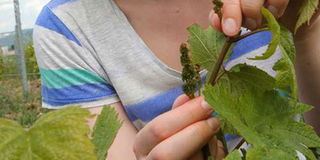Appeal for change of emphasis to cope with extinction bound to cause fireworks

This photo taken on May 27, 2016 shows a technician of the Interprofessional Committee of Champagne Wine (CIVC) showing an inflorescence of a hybrid vine plant from research conducted jointly by the CIVC and the National Institute of Agricultural Research, to develop grape varieties adapted to climate change and disease resistant, in Epernay, northereastern France. PHOTO | FRANCOIS NASCIMBENI | AFP
What you need to know:
Of course species adapt.
They even evolve.
These processes, however, aren’t infinite.
Once a species is extinct, ones that depended on it join the line, on and on until there’s a cascade.
That would make the list of known extinct species a beginning.
With the congress of nature conservationists’ umbrella organisation meeting in two weeks, a new appeal by an Australian researcher calling for a change of emphasis to cope with extinction of species is bound to cause fireworks.
The International Union for Conservation of Nature (IUCN) World Conservation Congress will meet in Hawaii from September 1 to10. It brings together government, non-governmental conservation groups and industries every three to four years to discuss policies.
Sensationally, the MailOnline headlined its story of the report published in journal Nature Communications last week “Climate change is NOT the ‘biggest killer’ of wildlife: Guns and tractors threaten biodiversity more than global warming”.
The Australian researchers didn’t mention guns and tractors. Anyway, they actually acknowledged climate change plays a role in the extinction. However, its effect pales when compared with human activities.
An analysis of 8,688 species of animals and plants considered ‘threatened ‘ or ‘near-threatened’ showed more than a half are victims of human bashing. Only a mere 16 per cent is a casualty of climate change.
And how does the human bashing go: destruction of habitats—read ecosystems—for plantations, building metropolises, ad infinitum of what passes as development. And as if that isn’t enough, add gluttonous over-harvesting and accompanying waste.
'INCREASINGLY SCARCE'
What this means is, as noted in another study by the European Commission, Joint Research Centre, also published by Nature, “Resources that had been largely available in the past are now becoming increasingly scarce, putting at risk the species that rely on them”.
Of course species adapt. They even evolve. These processes, however, aren’t infinite. Once a species is extinct, ones that depended on it join the line, on and on until there’s a cascade. That would make the list of known extinct species a beginning.
James Watson, a bio-diversity expert and co-author of the first report cited here, was reported by the Mail as saying Earth has now entered a “mass extinction event”. Species are disappearing 1,000 to 10,000 more quickly than a century or two ago. There have been six such wipe-outs – up to 95 per cent – in the past half-billion years. No mention of Homo sapiens’ fate!
“Addressing the old foes of over-harvesting and agricultural activities is key to turning around the biodiversity extinction crisis,” said lead author Sean Maxwell, a professor at the University of Queensland, Australia. In a statement, he said these threats “must be at the forefront of the conservation agenda’ rather than climate change”.
That’s bound to cause fireworks. Under the Paris Agreement in December, billions of dollars is to be mobilised to help 195 nations to cope with climate change. In the past few years, controlling climate change – global warming et al – has overshadowed traditional conservation methods.
Essentially, Maxwell was saying the billions are going the wrong way and money features in IUCN meetings. Inadvertently, Peter MacIntyre, an expert on the ecology of fresh-water systems at the University of Wisconsin, has advice for the IUCN: “There is no need to see trade-offs among different conservation priorities—we needs them all,” he told the Mail.




